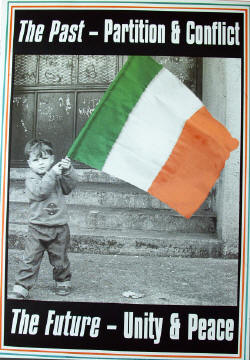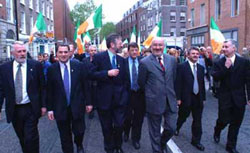 |
Irisch
Republikanische Solidarität
|
 |
DEJA VU AS BRITAIN WAIVES THE RULES OF DEMOCRACY
Sinn Fein President Gerry Adams has urged people to demonstrate
for their right following a decision by the British government to
suspend the election at the request of the Ulster Unionist Party
leader David Trimble.
Amid a wave of shock and disgust at the move -- the second
postponement of the elections and the twelfth time electoral
rules have been changed in the past few years -- Sinn Fein
leaders have appealed for calm.
Mr Adams called for a peaceful protest to take place on the
scheduled election date -- May 29 -- following the British
government's decision to prevent an election in which its
favoured parties, the nationalist SDLP and unionist UUP, were
expected to suffer in the polls.
The British government's decision to abandon elections until the
autumn was strongly criticised by the Irish government and all
the North's political parties, apart from the UUP.
Anger was deepest amongst republicans and nationalists and the
latest shock to the political system is expected to lead to
protest rallies and street demonstrations. The suspension of the
electoral process was being seen as a denial of the peaceful and
democratic means which republicans have long been urged to adopt.
The announcement that an election is being cancelled following
the official start of the campaign has thrown up unprecedented
legal questions. On a practical level, the British government
will have to swiftly deal with the issue of election costs
following the spending of tens of thousands of pounds on election
literature, party political broadcasts, and so forth.
Election broadcasts from the UUP, DUP and SDLP had already been
aired on television this week before Tony Blair announced he was
postponing the election, forcing the BBC to abandon Sinn Fein's
broadcast just before 7pm last night.
However, the British government and the Ulster Unionist party
maintained that postponement of the May 29 assembly vote to the
autumn was necessary because the IRA had failed to make clear its
future intentions despite a statement and extensive clarification
received through Sinn Fein negotiators over the past week.
With the Good Friday Agreement in uncharted territory, there are
real fears that the British government may now never hold an
election or move to end Direct Rule from London. Demographic
changes mean that unionists enjoy diminishing power within the
Six County area, and the prospects of a smooth and peaceful
transition to a new political dispensation appear more remote
than ever.
Meanwhile, a dangerous political vacuum is opening up for the
summer months and contentious parades by the Protestant marching
orders have to potential to fuel conflict.
THE WEEK FROM HELL
Last Sunday, Gerry Adams made a keynote speech in which he
addressed in a direct and fortright manner the concerns about the
IRA statement that had been expressed by the two governments. In
that speech, he said that the IRA statement, unmatched by any
from the IRA leadership in this or indeed any other phase of
their struggle, points the way forward.
While welcoming the speech, Tony Blair came back on one question.
On Wednesday afternoon in Belfast, Gerry Adams again stretched
the republican constituency to address that outstanding point
with a speech to satisfy the latest demand.
He did so, he said, despite that he and other Sinn Fein leaders
had received an unprecedented number of calls from republicans
and nationalists expressing real anger about what was going on.
"They are saying 'go no further, no more. There has to be a
limit'," said Adams, who added that this was a sincere response
from people who were deeply upset. "There is an anger and
resentment among republicans about the insatiable demands of the
unionists, which have been supported by two governments that
should know better," he said.
"This is not about the IRA," he added. "It is about the
securocrats within the British establishment who can't cope with
the change represented by the Good Friday Agreement.
"We want equality for everyone," he stressed. "After a
lot of
reflection, I have decided to make further remarks that will
stretch our people even more. It is an attempt to frustrate those
who are trying to derail the process."
The Sinn Fein leader appealed to people to take ownership of this
process of change to claim their entitlements and rights.
A group of 12 influential US Congressional Representatives,
representing the Friends of Ireland and the Ad Hoc Committee on
Irish Affairs, put their names to a public statement calling on
the British government and the Ulster Unionists to engage with
Gerry Adams on the basis of his statement last Sunday and for the
elections to go ahead.
Gerry Adams's statement was predictably rejected by David
Trimble, but the two governments also chose to respond
negatively, indicating that even the final step they themselves
had asked for, was not enough.
After Gerry Adams has seized the initiative and addressed the
governments' concerns to try to break the logjam, Blair, Trimble
and Ahern looked to move the goalposts again with new questions
and requirements.
Republican spokespersons reacted furiously on Wednesday evening
as the latest Adams statement was rejected. "We have made a fair
and honourable attempt," said Mitchel McLaughlin. "The paper
chase is over. We've answered enough questions."
As the futility of the endless cycle of demands became
transparent, matters came to a head. By Thursday morning, the
British government had abandoned the political process -- and the
democratic process.
Tony Blair claimed his decision to postpone the election had not
been made at the behest of UUP leader David Trimble, a claim that
has been greeted with derision, particularly by Ian Paisley's
DUP. The hardline anti-Agreement party will once again garner
support at the sight of the British government repeatedly moving
to protect their main political rivals from the polls.
With David Trimble's credibility at an all-time low, the DUP
could soon stake a claim to represent the majority unionist
opinion in the North of Ireland.
Meanwhile, republicans are gathering on Sunday for rallies to
mark the 22nd anniversary of the hunger strike.
Mr Adams said: "People are telling me it is... as if we are back
to the days of the civil rights, and when they're (the unionists)
saying there should be no Fenians about the place. It is as if we
are back to the days of the British government having a unionist
veto."
He that the British government had gone against the wishes of all
but one of the North's political parties and the Irish government
in delaying the election.
"Once the Good Friday Agreement was voted upon by people north
and south of this island, no British government had any right to
interfere with any electoral process," he said.
"Neither have they the right to disregard the Taoiseach [Irish
Prime Minister Bertie Ahern] who says 'let the election go
ahead'."
'ABSURDITY'
Mr Adams said instead of moving the process forward, Tony Blair
had compounded the difficulties faced in the process by opting
for postponement.
He added that the IRA had answered Blair's questions about its
future intentions.
"When I made my remarks on Sunday and Mr Blair queried my answer
on the issues of IRA activity, I gave him his answer and gave him
precisely the answer he asked for at that time," he said.
"He is now looking for a different answer. So rather than moving
the process forward, it has in many ways compounded the
difficulties.
"The absurdity of him (Blair) saying that all problems should be
resolved politically, as he announced the disenfranchising of
people and cancelled an election, will not be lost upon anyone,"
he said.
At a press conference on Thursday after the election postponement
was announced the Irish Prime Minister, Taoiseach Bertie Ahern,
said the election postponement "causes more problems than it
solves".
"The Assembly has done a full term and this is the time for an
election," he said. "That is our view. We have endeavoured to
convince the British government of our arguments. In the end they
decided to go an alternative route."
Despite this disagreement, he said, "the strength and critical
importance of the partnership between the two governments will
endure". He said that he, the Minister for Foreign Affairs, Mr
Cowen, and the Minister for Justice, Mr McDowell, would work over
the weekend on what approach to take in their talks with Mr Blair
next week. "While we are disappointed today we will dust
ourselves off and get on with it next week."
'GET A GRIP'
Mr Mark Durkan of the SDLP said it was a matter of "profound
regret" that he was witnessing the move from "the politics of
the
last ambiguity to the politics of the last absurdity".
He said the further postponement of elections would add to
complications rather than resolve them.
"We should not be in this situation," he said. "The governments
should not be allowing the situation to go in this direction.
Tony Blair needs to get a grip on things and he needs to return
to the terms on which he himself was working before this."
The DUP said Mr Blair was "behaving no better than the dictator
that he went to war to remove from Baghdad".
Mr Sammy Wilson said: "It now seems that the opportunities for
the population of Northern Ireland to express their political
views can be denied at the whim of the British Prime Minister."
The DUP deputy leader, Mr Peter Robinson, said the postponement
was ordered by Downing Street "to save David Trimble's bacon".
McDOWELL GAFFE
As tensions simmered over the latest collapse in peace efforts,
Sinn Fein President Gerry Adams MP this morning said that he has
no confidence in Michael McDowell of the Progressive Democrats
party, as a negotiator either with the British government or the
Unionists.
The Justice Minister earlier described the Irish government role
in the process as an "honest broker". The comment indicates
a
serious misunderstanding of Dublin's role in the Good Friday
Agreement, which has constitutional status under Irish law.
Mr Adams said: "The Irish government are co-equal partners with
the British government and they have a primary responsibility to
uphold the rights of all Irish citizens. That means acting in
Irish national interests and upholding Irish rights including, in
particular at this time, the rights of citizens in the north."
"Mr. McDowell's protestations at the stopping of the election and
the disenfranchisement of citizens are not credible.
"It is little wonder that the British government is so dismissive
of the views of both the Taoiseach and all parties on the island,
with the exception of the UUP, given Mr. McDowell's explanation
of the Irish government role."
Mr Adams said it was obvious from the Taoiseach's remarks that he
did not agree with the suspension of the elections that the
British government was calling the shots in the process.
"I don't expect the unionist political leadership to behave in
any other way. It wasn't David Trimble who cancelled the
election. He didn't take the decision. It was taken by Mr Blair
and he disregarded the wishes of everyone else"."
Letzte Änderung:
06-Sept-03